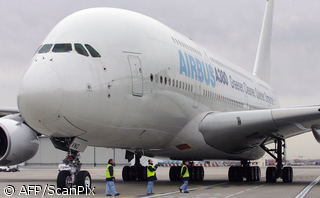For several years the position of Polish exporters on the markets of the former Commonwealth of Independent States has been clearly weakening
Published:
5 May 2003 y., Monday
In order to spur on trade, presentations of Polish exporters are gaining popularity. One such presentation is the Polish National Exhibition in St. Petersburg.
Geographic proximity, relatively small competition from local manufacturers who are not capable of satisfying the growing demand for modern products and, contrary to common belief, the increasingly wealthy and demanding customer, are the advantages of the "eastern market." Why then does trade with the countries of the Commonwealth of Independent States (CIS) constitute as little as 7.1 percent of the global value of Polish export?
The position of Polish companies is weakened by competition from the Western businesses that are perfectly aware of the perspectives which an active and strategically planned entry into Eastern markets can accomplish. Entrepreneurs from Germany, France and the United States, supported by the appropriate funds, first promote and then successfully sell their products in Russia and Ukraine or make direct investments there.
The decrease in the amount of Polish agriculture and food products exported to Eastern markets has stemmed from the fact that big international concerns such as Nestlé, Danone or Unilever directly entered this strategic area. However, the issue of Western competition is only a part of the answer to this question and the possibility of development for Polish exporters on the markets in the former Soviet Union.
One of the most serious difficulties Polish companies encounter is a considerable risk connected with signing commercial contacts with partners from the East who frequently appear to be insolvent and do not honor their contracts. According to Robert Stawski from the Promotion Chamber of the Polish Chamber of Commerce, businesspeople from Russia frequently do not understand the term "advance payment" and sometimes want to pay for the products only after they sell them. For obvious reasons, these terms are hard to accept for Polish manufacturers, which are mostly small and medium-sized companies. The state does not guarantee any protection for companies against situations in which partners from Russia, Belarus or Ukraine do not fulfill the terms of a commercial contract.
Šaltinis:
warsawvoice.pl
Copying, publishing, announcing any information from the News.lt portal without written permission of News.lt editorial office is prohibited.
The most popular articles
 EBRD and Latvia has signed Share Purchase Agreements providing that following the increase of equity capital the EBRD will purchase 57,506,825 ordinary shares comprising 25% and 1 share of the Bank's equity capital.
more »
EBRD and Latvia has signed Share Purchase Agreements providing that following the increase of equity capital the EBRD will purchase 57,506,825 ordinary shares comprising 25% and 1 share of the Bank's equity capital.
more »
 This dreamy scene of money raining down on Wall Street amid a deep recession has given a street artist a big break. Peter Zonis now exhibits his works in the lobby of an office building in New York's midtown Manhattan.
more »
This dreamy scene of money raining down on Wall Street amid a deep recession has given a street artist a big break. Peter Zonis now exhibits his works in the lobby of an office building in New York's midtown Manhattan.
more »
 During the draw another five winners of the Danske Bankas monthly Scholarship award were announced.
more »
During the draw another five winners of the Danske Bankas monthly Scholarship award were announced.
more »
 Within January - March this year, the turnover on the accounts of AB Bank SNORAS payment cards increased by LTL 202 million or 18 per cent and on 31 March this year reached LTL 1.3 billion.
more »
Within January - March this year, the turnover on the accounts of AB Bank SNORAS payment cards increased by LTL 202 million or 18 per cent and on 31 March this year reached LTL 1.3 billion.
more »
 Fitch Ratings affirmed AB DnB NORD Bankas short term borrowing rating F1, individual rating “C/D” and the support rating “1”.
more »
Fitch Ratings affirmed AB DnB NORD Bankas short term borrowing rating F1, individual rating “C/D” and the support rating “1”.
more »
 Taking into account changes on international and domestic money markets AB DnB NORD Bankas has changed individual and corporate customers time deposit rates.
more »
Taking into account changes on international and domestic money markets AB DnB NORD Bankas has changed individual and corporate customers time deposit rates.
more »
 The G-20's response to the world food and financial crisis, and efforts to make ACP-EU economic partnership agreements flexible enough to meet development needs, took centre stage at the 17th session of the ACP-EU Joint Parliamentary Assembly in Prague from 4 to 9 April.
more »
The G-20's response to the world food and financial crisis, and efforts to make ACP-EU economic partnership agreements flexible enough to meet development needs, took centre stage at the 17th session of the ACP-EU Joint Parliamentary Assembly in Prague from 4 to 9 April.
more »
 European aviation will be governed by more efficient rules, leading to shorter flights, fewer delays and reduced fuel consumption, thanks to the adoption today by the European Parliament of the “Single European Sky II” legislation.
more »
European aviation will be governed by more efficient rules, leading to shorter flights, fewer delays and reduced fuel consumption, thanks to the adoption today by the European Parliament of the “Single European Sky II” legislation.
more »
 Late payment for work performed, a perennial problem in Europe, is now hampering recovery from recession.
more »
Late payment for work performed, a perennial problem in Europe, is now hampering recovery from recession.
more »
 On 8th April 2009 International Rating Agency Fitch Ratings has changed Bank SNORAS Long-Term Issuer Default Rating to ‘B+'.
more »
On 8th April 2009 International Rating Agency Fitch Ratings has changed Bank SNORAS Long-Term Issuer Default Rating to ‘B+'.
more »